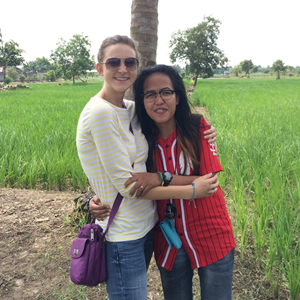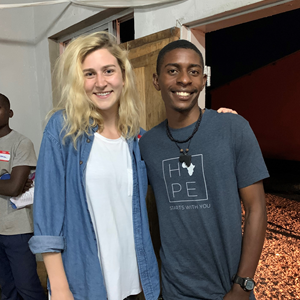Wealth Through Their Eyes
Written by Anna Davey, FPQP™
When we reflect on the concept of wealth, we don’t just think about the monetary value of the assets or resources that have been accumulated — we also consider the opportunities it can provide and the feelings it can provoke. Accumulating wealth allows us to dream about the future, about what we might do with the wealth that we and those before us have acquired.
But a recent study from Ameriprise Financial found that among people with $1 million or more in investable assets, only 13% consider themselves wealthy; in fact, 25% referred to themselves as middle-class. The remaining 87% who do not consider themselves wealthy have, on average, between $1 million and $5 million in investable assets, which actually puts them somewhere in the top 3%–10% of the United states population in terms of wealth.[1]
If someone with $1 million or more in investable assets believes they are not wealthy, then what criteria do people use when measuring wealth? Moreover, what should I consider when I think about wealth? Research has shown that the definition of wealth is somewhat malleable and often subjective; it can mean many different things to many different people.[2] I have met dear friends in my international travels as well as right here in St. Louis, and as I thought about them, I realized that their picture of wealth might also be vastly different from my own. Do they measure wealth purely in terms of physical assets, or do they consider other factors? I decided to find out for myself.
I interviewed three of my friends, all from very different backgrounds and cultures, about how they measure wealth. Each of my friends had their own unique perceptions of wealth, but there was a common thread: their life experiences have dramatically shaped how they interpret wealth. Physical assets are recognized as the main criteria of wealth, but I have found that there are other recognized forms of wealth such as societal wealth, physical wealth, and time wealth. My friends’ stories are a perfect example of how these alternative definitions of wealth can be applied.
Fella
Fella grew up on the outskirts of an overpopulated, landlocked city on the island of Sumatra, Indonesia. She was able to attend a four-year university and graduated with a degree in English Literature. In the past year, along with her family and her peers, Fella was hit hard by the economic impact of COVID-19, leaving her to wonder what’s next and how she might make a living for herself.
To Fella, financial wealth is defined as having enough saved to live on for a couple of years, as well as the ability to financially help others; her main aspiration is to make sure that her mother is provided for. Before the pandemic, Fella worked for a cruise line, which meant she worked, slept, and ate in the same location nine months out of the year, without a day off and with no opportunity to separate herself from her work environment.
After her recent experience being laid off and without work for nearly a year, she expressed her desire to accumulate time wealth. Having been disappointed by a traditional job structure, Fella is eager to work hard and create her own business so that it might not only provide her with time flexibility, but serve as a source of independence as well. To Fella, building time wealth starts by creating a work structure that is conducive to sustainability and self-sufficiency, so she can avoid relying on individuals and banks to help her make it through difficult times.
Hasnaa
Hasnaa grew up in a well-to-do family, living outside the city of Damascus, Syria. She didn’t attend college, but attending college wasn’t common for women there. She lived in a beautiful villa with her husband’s family, who owned several jewelry shops and were able to provide a comfortable living for them. She was never in need, until one evening when missiles and bombs destroyed everything she had known and threatened her very life. She fled in the middle of the night with her three children and husband to a neighboring country; seven years later, she was granted refugee status and welcomed into the United States.
Hasnaa left everything behind, including any semblance of financial wealth or familial support. But despite the hardships she has endured, Hasnaa told me that she has always felt wealthy — even in the midst of losing her home and livelihood — because of “her beautiful family and children who are in good health.” Hasnaa knows she is not financially wealthy, but that doesn’t matter. She has a happy and healthy life; therefore, she has obtained physical wealth. And that is the most important form of wealth to her.
Haward
Haward spent the first seven years of his life in a mud hut in the northern region of Zambia, Africa. The next 10 years were spent living in dug-out caverns in the jungle floor, or among the thick branches overhead — a real-life Jungle Book! Paper money was meaningless; Haward’s currency was buffalo hide, medicinal herbs, and handcrafted tools. He grew up in isolation, always scavenging for his next meal. Only in the last seven years has he lived a life outside the jungle and in civilization.
Adjusting to communal living was difficult. In his adjustment years, he was often quiet, unsure how to interact with other members of his new community. Although he was in the same country, he felt like he was from another planet — and so did the members of his new community. It took years for Haward to become comfortable in his new environment. Today, Haward works with the non-profit organization African Vision of Hope, where he leads a housing program for homeless boys who are struggling with the same loneliness and isolation that he endured in his own youth.
Haward’s life now has tenfold the value as it did before, not because he has financial wealth, but because he has societal wealth. He has learned how to comprehend and interpret body language, the meaning of friendship, and the value of character and community. To Haward, societal wealth is the foundation of all wealth — financial or otherwise.
Closing Thoughts
These stories remind us that wealth can come in many forms, and each of us defines and values wealth in different ways. Fella, Hasnaa, and Haward all come from different cultures with different experiences, different religions, and different hardships, but they have all taken their experiences and used them to create a mosaic of what they consider wealth and success.
These conversations with my friends were an important reminder that the next time I assess my own wealth, I need to look beyond my financial picture and incorporate time, societal and physical wealth as well. In addition to asking ourselves “Am I financially wealthy?” it might be helpful to also consider “Am I striving for wealth in all areas of my life?”
[1] Ameriprise Financial, Majority of Investors with $1 Million or More in Assets do not Consider Themselves Wealthy.
[2] The Cut, Why You Feel Richer or Poorer Than You Really Are.
